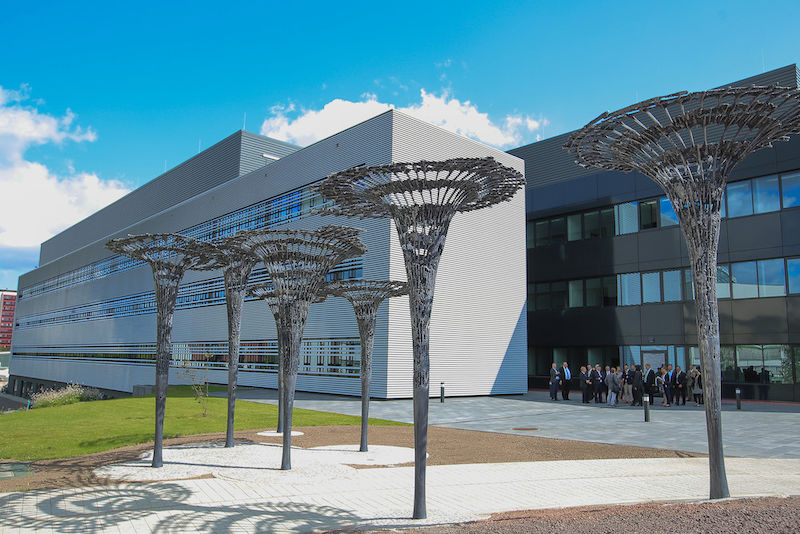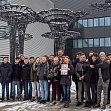Aktuelles
August 2024: Charles Tanford Protein Centre as a pilot project for energy efficiency and energy saving
The KlimaPlanReal project is a sustainability programme at MLU that includes participative formates. Greenhouse gas reduction and the path to climate neutrality are central. In 2024, these topics are being addressed in the field of energy. The Charles Tanford Protein Centre has been selected as a pilot building in this context. The protein centre is ideally suited as a pilot building, as it combines many perspectives through its mixed use - from laboratory to secretariat under one roof. The multi-background project team has developed appropriate measures with the involvement of the directors of the Protein Centre. Central measures are an energy monitoring, an idea contest and a workshop on energy saving in labs. You are welcome to participate!
Neuer Forschungsgruppenleiter am Charles-Tanford-Proteinzentrum
Dr. Michael Böttcher hat den Ruf auf eine Juniorprofessur (tenure track) für Molekulare Medizin der Signaltransduktion an der Medizinischen Fakultät angenommen und im April seine Arbeit im CTP aufgenommen. Dr. Böttcher studierte Pflanzliche Molekularbiologie an der Universität Freiburg, wechselte nach dem Diplom (2005) aber in die Krebsforschung. Er erwarb seinen Doktorgrad am Deutschen Krebsforschungszentrum in Heidelberg und arbeitete dann als Postdoc, zunächst am DKFZ, später an der University of California in San Francisco. Ab 2017 war er als Projektleiter an den Berliner Max-Planck-Instituten für Molekulare Genetik und für Infektionsbiologie tätig. In seiner Arbeit benutzt er die CRISPR-Technik zur gezielten Störung von Genfunktionen und zur Identifizierung von genetischen Netzwerken, die die Krebsentwicklung steuern. Das Ziel ist letztlich, neue Behandlungsverfahren für therapieresistente Patienten zu ermöglichen. Die Mitglieder des CTP wünschen Herrn Böttcher viel Erfolg beim Aufbau seiner Arbeitsgruppe und freuen sich auf die Zusammenarbeit mit ihm.
Prof. Sacha Baginsky
Unser Kollege Prof. Sacha Baginsky, Charles-Tanford-Proteinzentrum und Inhaber des Lehrstuhls für Pflanzenbiochemie, Institut für Biochemie und Biotechnologie, hat einen Ruf der Ruhr-Universität Bochum auf einen Lehrstuhl für Pflanzenbiochemie angenommen und dort am 1. April 2019 seine Arbeit aufgenommen. Die Mitglieder des CTP wünschen ihm alles Gute. Der Lehrstuhl für Pflanzenbiochemie an unserer Universität ist zur Neubesetzung ausgeschrieben.
Prof. Andrea Sinz
Unsere Kollegin Prof. Andrea Sinz, Charles-Tanford-Proteinzentrum und Inhaberin des Lehrstuhls für Pharmazeutische Chemie und Bioanalytik im Institut für Pharmazie, hat einen Ruf an die Universität Frankfurt auf einen Lehrstuhl für Pharmazeutische Analytik abgelehnt und ein Bleibeangebot der Universität Halle angenommen. Frau Sinz befasst sich mit der massenspektrometrischen Analyse von Proteinstrukturen. Sie ist Sprecherin des Graduiertenkollegs 2467 "Intrinsically Disordered Proteins – Molecular Principles, Cellular Functions, and Diseases". Die Mitglieder des CTP freuen sich auf die fortgesetzte Zusammenarbeit mit ihr.
November 2018: Funding for new Research Training Group RTG 2467 "Intrinsically Disordered Proteins – Molecular Principles, Cellular Functions, and Diseases" (Speaker Prof. Dr. Andrea Sinz) granted by the DFG
Approximately 40% of amino acid sequences in higher eukaryotes are predicted to be intrinsically disordered (intrinsically disordered proteins, IDPs and intrinsically disordered regions, IDRs) lacking defined structural elements. Many of these flexible proteins and protein regions remain understudied. This is despite their importance in regulating fundamental biological processes and in the generation of dynamic architectural superstructures, including, e.g., membrane-less organelles.
IDPs/IDRs will be investigated by an interdisciplinary group of research scientists composed of biochemists, biophysicists, and cell biologists. Their complementary scientific backgrounds will enable studies ranging from the in vitro characterization of IDPs/IDRs to their investigation within cells. A major focus will be the study of IDP/IDR interactions with proteins as well as RNA. All of the planned RTG projects address key questions on the molecular processes that govern how a single IDP/IDR might adopt multiple conformations upon protein- or RNA-binding.
November 2018: ERC President Prof. Dr. Jean-Pierre Bourgignon visits the Charles-Tanford-Proteinzentrum
On Tuesday 6th November, the President of the European Research Council (ERC) Jean-Pierre Bourguignon visited the Proteinzentrum to meet with ERC grant holders from Sachsen-Anhalt. After receiving a short introduction to the history of protein science in Halle and the establishment of the Proteinzentrum, Prof. Bourguignon and ERC grant holders toured the labs of ZIK HALOmem group leaders Carla Schmidt and Panagiotis Kastritis, followed by the Core Facility Imaging (Nadine Bley). He went on to visit both the Max-Planck-Institut für Mikrostrukturphysik with Stuart Parkin and the Leopoldina, where a podium discussion on ERC funding opportunities and experiences was held.






